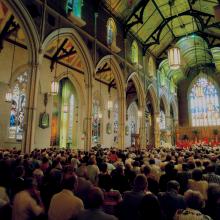preach
Screenshot via The White House / Youtube.com
“If Easter means anything it’s that you don’t have to be afraid,” President Obama said, to the scattered “amens” and grunts of agreement from the attendees of the White House’s Easter Prayer Breakfast on March 30.

Image via Josef Hanus / Shutterstock.com
It’s hard to stand in front of a congregation and talk about domestic violence.
It’s hard, because you never really know the stories of the people sitting there.
Who might have experienced domestic violence in their lives, in their home growing up, in a relationship during high school, on a college campus, in the home where they now reside?
Who might have experienced it last night? Who might have been told by their mother or religious leader that they cannot leave an abusive marriage because they would be breaking their vows? Who might have struck out at a partner? Who might have let their needs for control overwhelm their sense of self-restraint? Who might want to mask their violence with a smile or generous donations?
It's hard to stand in front of a congregation and talk about domestic violence. But it’s essential.
It’s essential because too often in the past, religious traditions have been used to defend an abusive patriarchy, to bind victims to marriage commitments that are undermined by intimate violence, to encourage people to “offer up” suffering rather than change the conditions that cause it.
It’s essential because shining a light of the reality of domestic violence is a critical step in creating pathways to safety for those who are victims. It’s essential because speaking out about domestic violence as a violation of God’s love can give victims strength to seek a better way. It’s essential because naming domestic violence as evil can help call perpetrators to account – and perhaps to repentance and treatment.
IT IS EASY, and a lot more comfortable, to identify and name dysfunction outside your family. It’s an entirely different endeavor, however, to label inappropriate behavior in your own home.
That’s the situation I find myself in as a lifelong member of the black Baptist tradition—one that, by and large, refuses to ordain women ministers and call them into the pastorate. I can no longer keep silent. My spirit won’t let me be quiet about a system where injustice is nurtured.
Women are the backbone of African- American Baptist congregational life, yet they traditionally have been blocked from ordained ministry. I’ve watched this for years in Kentucky where I was born, raised, and currently live; experienced it in other places where I have resided; and heard the same story from Baptist female colleagues in ministry around the country. The same is also true in many white Baptist congregations, such as those affiliated with the Southern Baptist tradition. But I’m speaking here about the world I know personally.
Ironically, some of these black congregations and pastors who are unwilling to honor God’s call on the lives of women seeking ordination are the same ones who are quick to name a plethora of injustices perpetrated against black people as a race, and to demand quick resolution.
Doors for women called to preach the gospel of Jesus Christ have opened a little in recent decades. More women are being licensed, the precursor to ordination in the Baptist structure. But the process usually stops there, and women are left patiently waiting to be blessed into the fold. These “ladies in waiting” are allowed to lead ministries, teach, and occasionally preach, but rarely permitted to go beyond that.
Years ago on a bright Tuesday in March, I was driving to seminary and I found myself stuck in traffic on I-25. Sitting in a dead stop on the interstate I stared up into the clear blue Colorado sky and thought, “What in the world am I doing? I don’t believe a word of this Jesus stuff. I mean, It’s a fairy tale.”
But then in the very next moment I thought, “Except…throughout my life…I have experienced it to be true.”
I experience the gospel to be true even when I can’t believe it. And honestly sometimes I believe the gospel even when I don’t experience it. And I suggest to you today that this is why we have and even why we need Word and Sacrament. Because see, we are a forgetful people.
And it is to this office of Word and Sacrament that you have been called Matthew and I feel like in an ordination sermon, the preacher should in some way address the level of preparedness of the ordinand in question, and I am in a position to do just that.

Pulpit of St. Mary le Tower parish in Ipswich, UK. Via Wylio http://bit.ly/wTWgaL
Did you hear a particularly good sermon, homily, teaching, preaching, lesson or message this Sunday?
We'd love it if you'd share it with us.
Please email Cathleen (cfalsani@sojo.net) with links to audio, video or text versions of the message you heard, and we'll share the best of the best with the rest here on God's Politics.

